 As I mentioned in my recent review of Dead Men Tell No Tales, I love me some pirate games. Heck, I even own almost every game on our Top 10 Pirate Games list. So when I first heard about Rattle, Battle, Grab The Loot, a dice rolling pirate game from Portal Games, my interest was piqued. It’s a game where players will be dropping handfuls of dice into the box to plunder and swashbuckle their way to victory (or defeat). It certainly sounds unique, but is it fun? Let’s dive in and answer that question.
As I mentioned in my recent review of Dead Men Tell No Tales, I love me some pirate games. Heck, I even own almost every game on our Top 10 Pirate Games list. So when I first heard about Rattle, Battle, Grab The Loot, a dice rolling pirate game from Portal Games, my interest was piqued. It’s a game where players will be dropping handfuls of dice into the box to plunder and swashbuckle their way to victory (or defeat). It certainly sounds unique, but is it fun? Let’s dive in and answer that question.
Rattle, Battle, Grab the Loot is a dice rolling and ship building game for 2-5 players that takes about 60 minutes to play. In our experience, Rattle Battle plays best with 3-4 players.
Game Overview:
You are the captain of your very own pirate ship. However, you are not famous yet and your ship is still somewhat mediocre. But that’s OK because it’s time to go on an adventure. Each game of Rattle Battle is played out over a number of rounds. Each round, divided into two stages. The first stage is the sea battle (quest stage), where players go out on an adventure that is resolved by dropping dice into the box lid, fighting other ships, and collecting loot.
In the second stage, players head back to port to upgrade their galleons, hire crew, and maybe buy some victory points as they prepare for the next round of plundering. After a few trips out to sea, the pirate with the most victory points will be the winner!
Game Components:
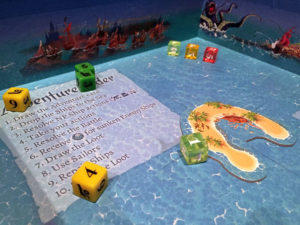
When all is said and done, it’s hard not to be impressed with the components in Rattle Battle. After you’ve punched everything out, sorted the cards, and are ready to go, you’ll be treated with piles of tokens, metal coins, custom dice, and more than a few decks of cards.
From the very start, I was first impressed with the great artwork in Rattle Battle. It has an almost comic feel to it, which works perfectly with the feel of the game. As you are dropping dice into the box, this obviously isn’t a game that you can take too seriously. The cards themselves sport a nice finish and feel like they will hold up well over times.
Each player begins the game with their own galleon, which comes in a few pieces. This is because a player’s ship can be upgraded during the game by inserting or layering different pieces into it. As you buy holds, canons, or crazy upgrades, your ship will expand and become a force to be reckoned with.
The game’s custom dice will be used to represent various ships during the game, from players to merchants, to the royal navy. Absolutely everything about Rattle Battle’s components makes you feel like you are getting your money’s worth…and then some.
That is, until you get to the rulebook. The rulebook is about 20 pages long and while it looks pretty, it’s not the best when trying to learn the game. Which is sad, because Rattle Battle really is an easy game to play, yet the rulebook makes the game feel incredibly complex. In addition to that, the concept of the ship dice is not explained very well and we played through half our first game completely wrong (more on that later). So while the rulebook isn’t the worst we’ve encountered, it definitely could have been clearer in a lot of areas.
How to Play:
Once the various decks and tokens are sorted, and each player has their starting galleon, it’s time to begin. Three scenarios come with the game, one of which is a tutorial scenario. Every scenario takes place over a number of rounds performed in 2 repeating stages.
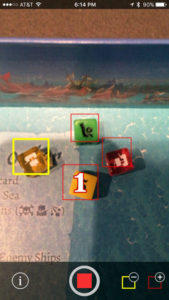
Quest Stage:
The question stage takes place over 10 phases (sounds complicated, I know).
1. Briefing: Draw the top card from the adventure pile and collect the necessary ships/tokens.
2. Ship Drop: Gather all player and NP (non-player) dice and drop them into the center of the box.
3. NP Ship Actions: Each adventure card will note what the special icon on the NP dice do if rolled.
4. Player Actions: Each player can take turns taking a single action. These are usually moving one of your dice or fire a canon. Movement is performed by moving one of your ship dice the length of a card (long side). A player can fire a canon the distance of the short side of a card. Either moving or firing requires spending the appropriate token.
5. Battle: Players battle NP dice now. Starting with the closest player die to an NP die and moving outward, players compare the values showing on both dice. Higher value sinks the lower. If the NP die sinks a player die, the next closest die is evaluated. Repeat as needed.
6. Coins Reward: Players gain one coin for each NP die sunk
7. Loot: Each player draws loot tokens from the loot bag equal to the amount shown on the adventure card.
8. Sailor Activation: Players may activate any sailors that have a power in this phase.
9. Ship repairs: Any player ships sunk during the battle must be repaired by discarding one loot token per die sunk.
10: Stow Loot: Each player ship die can hold 1 loot token, and a player’s galleon can hold loot in each of its holds, if it has any.
Port Phase:
After the battle, the players head to port to upgrade their ship and hire crew. There are six places in port a player can visit (in order). This phase allows players to exchange loot tokens for ship parts or sailor cards. The metal coins can be exchanged to buy victory point cards. Once each player has finished shopping, the first player token is passed and the next round commences.
Each adventure card has a number of rounds on it, each usually made up of 2 battles (and sometimes a crazy battle in between). After the final round of adventuring is finished, players head to port one last time. Players then count up victory points from cards, money, and possibly other sources. Most victory points is the winner.
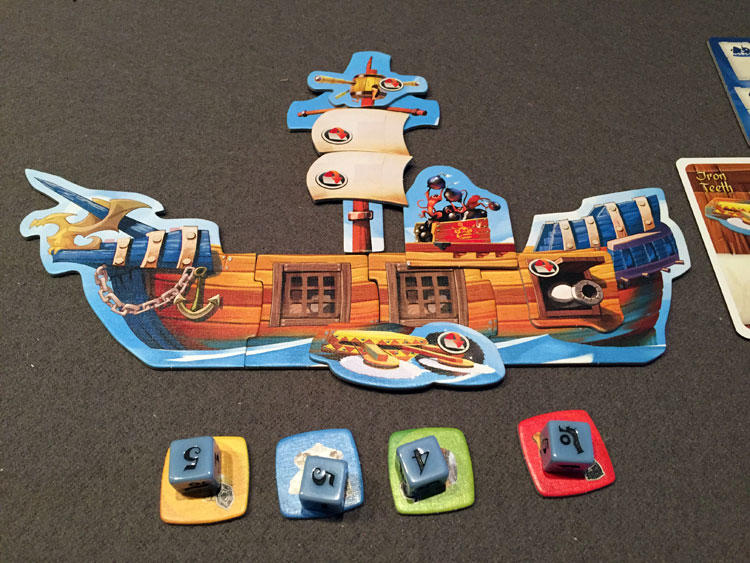
Game Experience:
As mentioned in the components section above, our first play of Rattle, Battle, Grab the Loot was a bit of a disaster. Halfway through the game we realized we were storing loot all wrong. We had thought when it said each ship can hold one loot, that it meant our big cardboard galleon. It wasn’t until we got to the tutorial card where it talked about discarding loot in the second battle of an adventure that we realized our mistake. The rulebook section under stowing loot could definitely been clearer. Needless to say, we abandoned the game and started over. Not a good start.
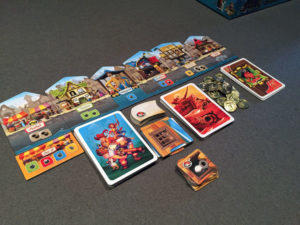
Once we were able to play correctly, Rattle Battle ended up being a bit of a mixed bag for me. One one hand, I LOVED the port stage. It was the best upgrading my ship, choosing crew members, spending loot and doubloons. Seriously, it was tons of fun! Watching my ships grow in size and power was awesome. The well-illustrated, high-quality components made this even better. You buy a buzz saw for the front of your ship and you get a token to fit ever so perfectly onto your ships bow. It was enjoyable and fun watching my ship come to life. Plus, you can get monkeys that throw bombs. How awesome is that.
But then you get to the quest stage. When I first saw that the sea battles were 10 phases long, I was a bit confused. That seemed incredibly complex for a dice game. Fortunately, in practice, it wasn’t that bad.
Where the game really started to drag for me was with the player actions. I hated this phase. Having 4 players hunch over a box, measuring ship distance with a ruler or card, felt really out of place in this game. It’s almost like we transitioned into a crazy family game into a miniatures game (and I hate minis games with this kind of measurement).
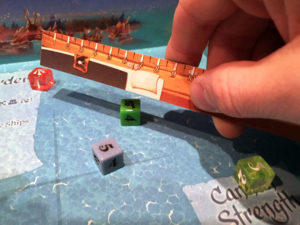
I get why designer Ignacy Trzewiczek did this. Rattle, Battle is inherently a random game. From the cards you draw, to how the ships drop, to what numbers they roll, lady luck is going to be a big part of that game. Heck, even the rule book says this is a really random game. So to help mitigate it, he gave us movement rules and attacking rules. Yet in practice, they both feel really clunky. The game just stalls out during this phase.
Rattle Battle is a light game, yet the play time can sometimes take up to 90 minutes. That’s just too much for what the game is. I think I would have preferred quicker rounds of just dropping the dice and letting the chips fall where they may. Sure, luck is going to play a bigger role in the game, but I feel like it might even out over time. At the very least, the quest stages would speed by a lot faster and you could even throw in a few more trips out to sea and port.
I feel like it’s a shame that the two parts of this game didn’t flow better together. Because I liked the dice drop mechanic. It was a clever use of the game’s components and the randomness really doesn’t bother me. I’ve never had a huge problem with luck in games, as long as I know it going in. With Rattle Battle I expected it, so the high luck factor wasn’t an issue for me.
The game also includes a bunch of terrain pieces that can further affect how dice are dropped and the results. There is a lot of potential here for some crazy outcomes and a ton of fun. Even with the out-of-place nature of the player actions, I still had some fun out at sea. The crazy adventures in between the standard battles provided a nice break and were usually pretty entertaining.
Final Thoughts:
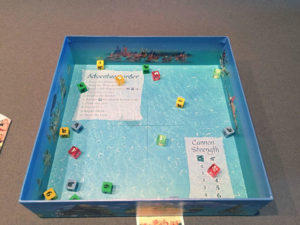
While I didn’t love Rattle, Battle, Grab the Loot as much as I expected to, I still found it to be pretty enjoyable. I loved upgrading and building out my galleon and think the dice drop was a really innovative way to handle the dice rolling.
That said, the player action phase during the quest stage can grind the flow of the game to a halt, especially with 4+ players. At that point, the down time can get a bit rough as players are measuring and assessing the situation.
I may have been a bit harsh on Rattle, Battle, Grab The Loot. That’s probably because I had such high hopes for this one. While I do think it’s still a good game, it’s just not as great as it could be. It does a lot of things right, but I feel like it tried to appeal to too many people and lost a little something along the way. While this one probably won’t make it to the table too often, I’ll still hold on to my copy for those times when I want to go on some crazy adventures.
If you’d like to pick up a copy of Rattle, Battle, Grab the Loot, you can get it for about $50.
Final Score: 3 stars – An innovative game that has some great ideas, unfortunately it’s held back a bit by some fiddly rules.
 Hits:
Hits:
• Upgrading your ship is tons of fun
• Enjoyed the dice drop mechanic
• Amazing components and artwork
Misses:
• Player actions can bog the game down
• Game can run a bit long
• Rulebook is unclear at times




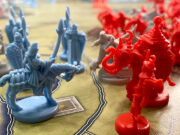
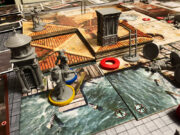

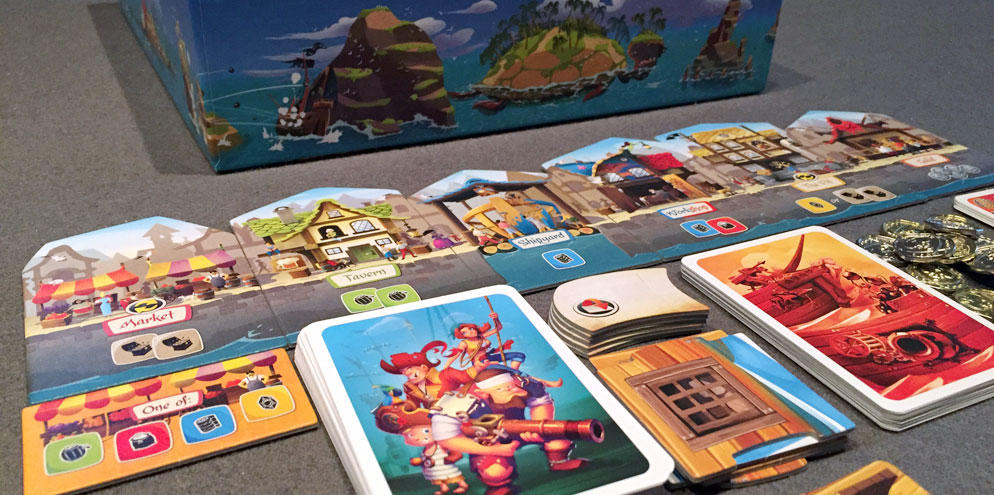















Hi. We could use some help for a legend of what the dice symbols mean. The rules are vague on this. TY
Hi Gayle, your best bet would be to contact Portal Games directly and ask for clarification. You can email them your questions at [email protected]
I just played this for the first and hopefully last time. Hated it. The dice drop, in theory, sounds cool, but in practice is terribly implemented. And while the actions phase drags combat down, it at least gives you some kind of agency to affect the battle. These battles don’t feel like they should, where you are supposedly a pirate on the high seas. I spent most ‘second battles’ just skipping them, because I already loot from the first battle and was just waiting to go to the port.
Also, because of the dice drop mechanic, most of the rounds you don’t even get to roll your own dice. So you are deprived of even the tactile quality of rolling dice, making the randomness even more annoying.
The port side of it and upgrading your ship, might have been cool in a better game. The art is fine. The combat is just terribly uninteresting and boring. Not to mention the unclear rulebook, making the learning curve unnecessarily BS.
For this game night, I brought a far superior pirate game (if only I’d known), Pirate’s Cove. All the systems work beautifully together. And when you are in combat, it is exciting, It feels like you have your pirate ship, battling other players or the NPC ships. You have cards you can get to help mitigate randomness, but even when you just go for it, it allows for those exciting moments where you have that one player holding one, just barely, but taking the other player down.
So yeah, Rattle, Battle, Grab The Loot is a terrible game with nice art and some decent ideas, that don’t really mesh well together. As you said, the game seems like it needs to play faster and looser.
I actually agreed with a lot of what you said up until Pirate’s Cove. While I actually own that game, I don’t find it to be all that good. It has its moment’s but also has a lot of flaws. I find Black Fleet to be way better than Pirate’s Cove.